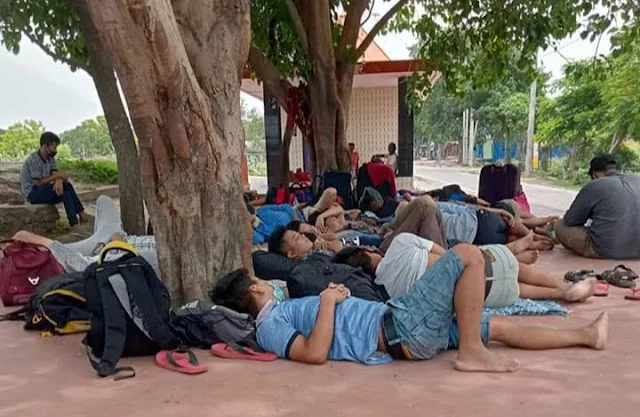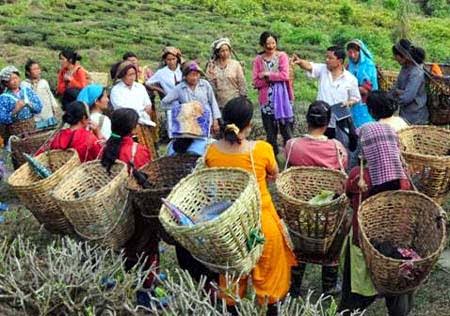 |
| Darjeeling tea denies justice to its labours |
They brave the winter chills, the rain, the clout from their masters and the indefinite shutdown of hills due to political stir. They brave all odds including the low wage compared to the prices at which tea is sold in the international market. The scene of the Darjeeling tea workers plucking tea leaves is euphoric to many of the people visiting the ‘Queen’ of hills, unaware of the hardships the workers face behind the joyous scene. Darjeeling and its tea industry is definitely synonymous to each other but what experts studying tea and its problems say shows a demographic plight the workers of Darjeeling tea industry are in.
“Darjeeling’s tea industry is in the midst of what most connoisseurs and market watchers would consider to be a revival, driven in part by fair trade,” said Sarah Besky, assistant professor of anthropology and natural resources and environment, who has spent years studying the lives of tea workers in this remote region of north eastern India, nestled in the Himalayan foothills.
“But ironically, fair trade and other programs that purport to provide justice to plantation workers in the age of global ‘ethical consumption’ have little effect in providing justice to the tea pluckers, who are mainly Indian Nepali or Gorkha women.”
In the U.S., the most-prized first-flush tea leaves—designated SFTGFOP; meaning “Super Fine Tippy Golden Flowery Orange Pekoe”—sell for more than $60 for eight ounces, when you can get them. But the field workers who pick the delicate leaves earn just over a dollar (Rs. 90 presently) for a full day’s work.
“Women in Darjeeling are keenly aware of the irony that they produce some of the world’s most expensive tea yet get paid a miniscule fraction of what this tea fetches abroad,” said Besky, who lived on the tea plantations talking with workers, plantation owners and area activists for months at a time from 2007 through 2010.
She is the author of “The Darjeeling Distinction: Labor and Justice on Fair-Trade Tea Plantations in India,” published by the University of California Press.
Established in the 1850s by the British, Darjeeling’s “tea gardens” are now owned by Indians who continue to operate them as plantations. Workers live in houses provided by their employers and are given allowances for food and certain household necessities—all in partial payment of wages.
“‘Fair-trade plantation may seem like an oxymoron,” Besky said. “Plantation workers are not small farmers. They are labourers who, like peasants, live and work on land they do not own.”
Besky discusses the impact of fair trade and other movements that brought Darjeeling tea plantations into the 21st-century market for geographically distinguished and ethically sourced food, and into India’s multiethnic democracy.
These movements have World Trade Organization Geographical Indication status, a distinction Darjeeling shares with famous place and food names like Scotch, Champagne, and Roquefort. the Gorkhaland agitation, a longstanding movement to form an Indian state separate from West Bengal, to include Darjeeling, its tea plantations and its majority of Indian Nepalis, or Gorkhas.
“Each of these strategies attempt to make plantation life ‘better’ by situating the plantation within a ‘Third World agrarian imaginary,” Besky said. “In essence, each is an effort to undo the injustices of the colonial past, yet each only partially addresses the concerns of plantation workers themselves.
“There is a deep disconnect between national, global and regional calls for justice, and the lives and work of the very people in whose names those calls have gone forth. The workers are keenly aware that in the market for justice, the tea plantation is not going anywhere.”
There are more than eighty tea gardens including both small and big operating in Darjeeling hills with Makaibari Tea estate, Happy Valley tea estate, Castleton tea estate to name a few famous ones. With merely Rs. 90 paid to the labourers, life at any stage seems difficult to them.
“Yes it’s really tough the going for us. A total of less than rupees five thousand at the end of the month. But, if you see the market value, the education of children and other expenses comparatively is expensive and the money we earn not even allows us to fulfill a small section of our livelihood. We have no option,” laments a tea garden labour of a tea garden in Darjeeling.
The operating trade unions at each of the tea gardens have this year demanded over Rs. 200 per day as wages. The West Bengal Labour department is responsible for chairing a tripartite meeting to bring out an amicable solution and fix a gentle rate for the labourers without harming the production cost and aspiration of the workers.
The plantation workers have their fingers crossed as the meeting is set to begin.
BY VIVEK GHATANI – Indian Gorkhas Exclusive





